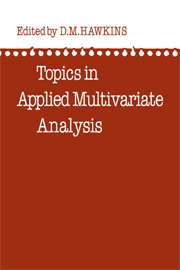Book contents
- Frontmatter
- PREFACE
- CONTRIBUTORS
- Contents
- CHAPTER 1 DISCRIMINANT ANALYSIS
- CHAPTER 2 COVARIANCE STRUCTURES
- CHAPTER 3 THE LOG-LINEAR MODEL AND ITS APPLICATION TO MULTIWAY CONTINGENCY TABLES
- CHAPTER 4 SCALING A DATA MATRIX IN A LOW-DIMENSIONAL EUCLIDEAN SPACE
- CHAPTER 5 AUTOMATIC INTERACTION DETECTION
- CHAPTER 6 CLUSTER ANALYSIS
- INDEX
CHAPTER 5 - AUTOMATIC INTERACTION DETECTION
Published online by Cambridge University Press: 05 November 2011
- Frontmatter
- PREFACE
- CONTRIBUTORS
- Contents
- CHAPTER 1 DISCRIMINANT ANALYSIS
- CHAPTER 2 COVARIANCE STRUCTURES
- CHAPTER 3 THE LOG-LINEAR MODEL AND ITS APPLICATION TO MULTIWAY CONTINGENCY TABLES
- CHAPTER 4 SCALING A DATA MATRIX IN A LOW-DIMENSIONAL EUCLIDEAN SPACE
- CHAPTER 5 AUTOMATIC INTERACTION DETECTION
- CHAPTER 6 CLUSTER ANALYSIS
- INDEX
Summary
INTRODUCTION
Automatic Interaction Detection (AID) is a family of methods for handling regression-type data in a way that is almost free of the usual assumptions necessary to process the data using linear hypothesis methods.
In AID, one has a dependent variable Y which one wishes to predict, and a vector of predictors X from which to predict Y. The predictors are all categorical (i.e. either nominal or ordinal), and generally take on only a few possible values. Interval predictors may be reduced to this form by grouping their possible values into classes, and then using the (ordinal) class variable as the predictor.
Various different methods within the AID family have been devised for situations in which the dependent variable Y is: (a) a scalar interval variable, (b) a scalar nominal variable, (c) a vector of interval variables. Other possibilities such as an ordinal Y or a vector of nominal Y are easy to fit into the general conceptual framework of AID.
The name AID suggests that the function of the technique is to discover whether the linear hypothesis model predicting Y from X contains only main effects, or whether interactions also occur. This is indeed one of the things that AID can do, but it has a number of other uses as well, which we consider overshadow this use in importance.
Before going into a detailed study of the aims and methods of AID, it may help to consider a simple example.
Information
- Type
- Chapter
- Information
- Topics in Applied Multivariate Analysis , pp. 269 - 302Publisher: Cambridge University PressPrint publication year: 1982
Accessibility standard: Unknown
Why this information is here
This section outlines the accessibility features of this content - including support for screen readers, full keyboard navigation and high-contrast display options. This may not be relevant for you.Accessibility Information
- 47
- Cited by
